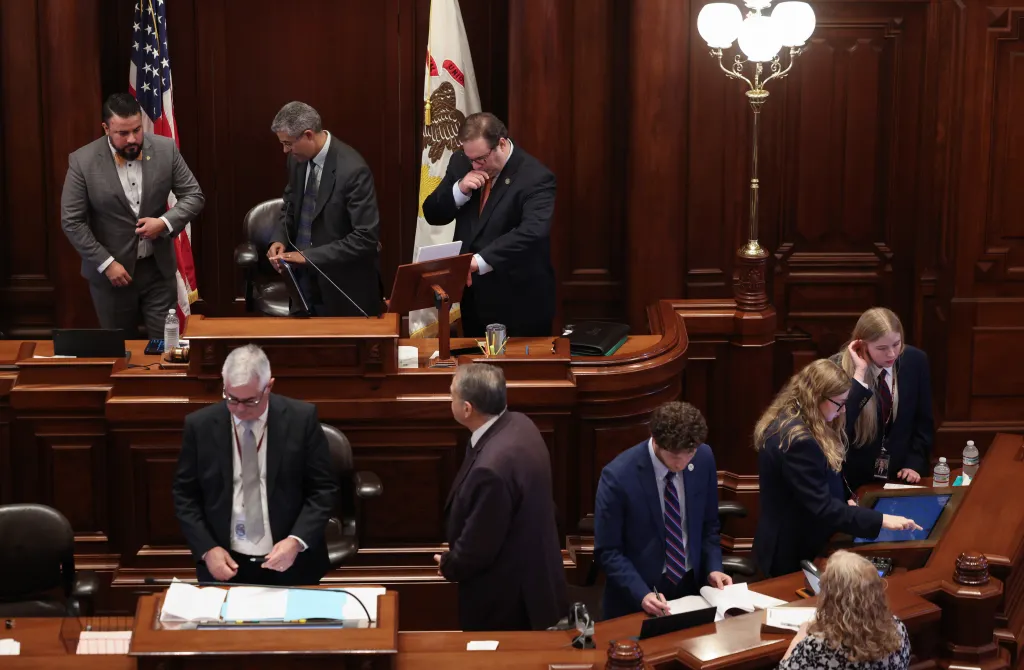Copyright Chicago Tribune

SPRINGFIELD — The Illinois House passed sweeping energy-related measures in the waning days of the General Assembly’s fall veto legislative session, backing the use of big batteries to help make wind and solar power more effective but raising questions about whether the legislation will increase or decrease energy bills. House Democrats said the legislation would eventually lower electric bills for Illinois consumers burdened by utility rate spikes driven by rising power grid demand, while Republicans noted the massive battery installations would be backed in part by a surcharge on consumers’ monthly bills. The disagreement mostly along party lines was reflected in the final 70-37 House vote Wednesday night on the 1,020-page energy bill that is poised to be taken up by the Senate on Thursday, the final day of veto session and the last scheduled legislative day of 2025. As the energy bill cleared one chamber, long-awaited legislation to reform and fund Chicago-area mass transit failed to advance publicly late Wednesday and into Thursday as top leaders negotiated privately. On the energy front, Democratic lawmakers who hold supermajorities in the House and Senate have been unable to convince their Republican counterparts, particularly those downstate who’ve repeatedly raised alarms in the last several months about increased utility rates, that the energy policy changes would lower electric bills. The bill is a result of negotiations between lawmakers, organized labor, environmental interests and other groups in response to an especially high demand for electricity in the last couple of years. Part of this is attributed to the 2021 Climate and Equitable Jobs Act, which aims to promote greater use of renewable energy by 2030 and eventually phase out fossil fuels, and to the prevalence of data centers that have taken up a significant share of the electrical supply due to the emergence of artificial intelligence technology. State Rep. Jay Hoffman of Swansea, the energy bill’s main House sponsor, warned during floor debate Wednesday night about how not passing the legislation could have grave consequences for consumers, especially at a time when the federal government has sought to cut spending. “Some would say let’s do nothing. Let’s put our head in the sand and act like just everything’s going to be OK and do nothing. Don’t do planning. Don’t put more capacity on the grid. Don’t make sure that we have energy efficiency,” he said. “But let me tell you this: Without immediate actions, Illinois stands to pay $9.5 billion in increased energy costs by 2034. Utility bills will directly increase by $1 billion by 2030, and Illinois will lose more than 50,000 manufacturing and energy jobs because of the federal budget cuts.” But House Republicans questioned the delayed gratification the new bill promised. Some savings from CEJA “never materialized,” Republican state Rep. Dan Ugaste of Geneva said, “and now we’re taking another swipe at it, hoping we get some cost savings at some point in the not-too-distant future. Our ratepayers are suffering now.” Republican state Rep. Brad Halbrook, a member of the conservative Freedom Caucus who represents Shelbyville, took it even further, calling the bill and previous attempts at energy legislation a “worship service at the altar of the dead green God.” “We were promised clean energy would mean lower costs, more jobs and a stronger grid. They promised a climate salvation that doesn’t exist,” Halbrook said. State Rep. Ann Williams, a Chicago Democrat who was one of the lead sponsors of CEJA, disputed claims that the 2021 law won’t save money for consumers by 2030, and also said battery storage in the new bill will “increase power on the grid and keep costs down.” “Affordability is at the very heart of this energy package and a direct response to consumer concerns about rising utility rates,” she said during Wednesday’s floor debate. As part of the energy bill, legislators called for adding 3 gigawatts of battery storage to the state’s electricity grid by 2030 — though Republicans and Democrats still disagreed on whether and how quickly the batteries would lower monthly bills enough to pay for themselves. The batteries would work in tandem with wind and solar to make the electricity they supply less intermittent. They require billions of dollars in upfront investment, to be financed by battery developers and secured through surcharges on consumers’ monthly utility bills. But according to an estimate released Monday by the Illinois Power Agency, the batteries would shave a few dollars per month off average residential electricity bills by 2031 by lowering anticipated rate increases for future space on regional electricity grids. The cost of getting 3 gigawatts of batteries up and running on the grid by 2031 would add 58-68 cents per month to the average residential bill for Ameren customers in mostly downstate Illinois and 40-48 cents for Commonwealth Edison customers in the Chicago region, according to the IPA analysis. However, the agency said, the batteries would pay for themselves by reducing the anticipated rate increases for future space on regional transmission grids. In total, by 2031, the batteries would reduce average Ameren residential bills by $3.90-$8.28 per month and average ComEd residential bills by $1.46-$1.85 per month, the agency said. Including all its other provisions, the energy bill would reduce average Ameren residential bills by $4.49-$10.59 per month and average ComEd residential bills by $1.46-$2.03 per month by 2031, the IPA said. In one big policy change from the new energy bill, for the first time since deregulating energy markets in 1997, the legislature would allow the Illinois Commerce Commission to sign long-term contracts and allow higher utility bills to procure new sources of electrical generation in the state. Deregulation didn’t provide as much new electricity for the state as hoped, said Mark Pruitt, former director of the Illinois Power Agency, a state energy regulator. That’s because regional grid operators, such as the Midwest Independent System Operator and PJM Interconnection, have been reluctant to hook up intermittent sources like wind and solar, despite their declining cost, he said. The state’s policy shift comes as Illinois faces looming electricity shortages not just due to rising demand from data centers, but also because of its plan to close 28 gigawatts of coal and natural gas generating plants by 2045 to improve air quality. The ICC and other agencies plan to issue a final report by mid-December on the adequacy of the state’s electricity supply through 2030. In addition, the bill would fund pilot programs for geothermal energy networks, repeal the existing moratorium on new large-scale nuclear construction and increase subsidies to retrofit homes to use less energy. Mark Denzler, president of the Illinois Manufacturers’ Association, dismissed the projected savings as the kind of Springfield promise that often fails to materialize. “There’s too much of a rate hike that we think is going to cause a negative reaction for Illinois families and Illinois businesses,” Denzler said in a press conference on Monday. Even with its new batteries, Illinois won’t have enough round-the-clock or baseload power and will still need to delay the planned closing of coal and natural gas power plants, Denzler said. Jen Walling, executive director of the Illinois Environmental Council, said her group supports the bill as a way to offset changes in federal policies, such as the phasing out of tax incentives for wind and solar power. “This is us responding to the federal cuts in a really robust way that no other state has done,” Walling said. “It’s going to mean we’ll save more through efficiency. It’s going to mean building more renewable energy. It means new money for battery storage, but we expect that to be a savings very quickly to consumers, as it has been in other states,’’ she said. Transit bill ‘not dead’ The House Democrats cleared the energy bill on the same day Gov. JB Pritzker shot down a plan pitched by those same Democrats to overhaul public transit in the Chicago region with a series of taxes and fees, including a 7% tax on streaming services like Netflix, a $5 surcharge on tickets to large events, an unprecedented tax on billionaires’ unrealized gains and a change to state law that would allow suburbs of Chicago to install cameras to ticket drivers who break speed limits. On Thursday, the governor said he met with Senate President Don Harmon of Oak Park and House Speaker Emanuel “Chris” Welch of Hillside overnight to “make sure that there was an understanding about what could pass” on transit. “The transit bill is not dead,” the governor said during an unrelated news conference in his ceremonial office in the Illinois State Capitol. “We’re going to do what’s necessary to get a transit bill passed.” Public transit advocates maintain that action will be necessary to avoid layoffs and service cuts. The governor said he, Welch and Harmon each discussed the revenue options on the table, but Pritzker largely declined to endorse any specific avenues for funding as he spoke to reporters Thursday, staying noncommittal on any particular revenue stream as he has previously. Instead, the governor confirmed he still opposed any “broad-based tax” increase, including statewide income or sales taxes. As of midday Thursday, no transit bill had been introduced that would appear to satisfy House and Senate lawmakers as well as the governor. After Thursday, the General Assembly is not expected to meet again until next year. Tribune reporters Dan Petrella contributed.



